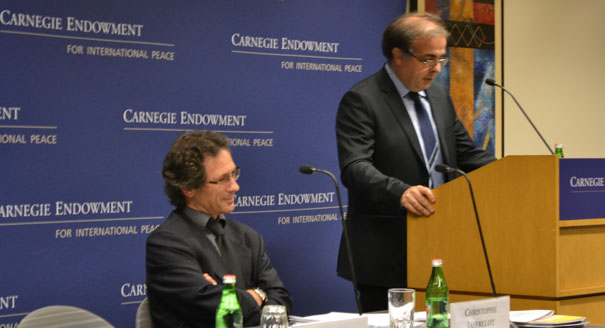Registration
You will receive an email confirming your registration.
IMGXYZ4015IMGZYXThe 2009 Indian general elections saw the Congress Party-led United Progressive Alliance retain power with a remarkable increase of seats in the National Assembly (Lok Sabha), leading to claims of a re-nationalization of Indian politics. However, many saw the success of the Congress Party as largely due to the fragmentation of the party system resulting from the regionalization of Indian politics.
Policymaking has already become problematic because of the presence of state parties representing regional interests within the ruling coalition. How long will it take to adjust to the erosion of the Congress and BJP-led coalitions? Carnegie's Christophe Jaffrelot discussed and Frederic Grare moderated.
State of the States
- Increasing Federalism: Jaffrelot suggested that the economic reforms of 1991 were the starting point for an increase in the latitude that the state governments enjoy when considering policy options.
- Spending without Taxing: Although the states receive major flows of revenue from the central government, Jaffrelot observed that states remain constitutionally limited in terms of their ability to independently raise revenue. He argued that this has been an impediment to a more complete regionalization of Indian politics.
- Pressures to Decentralize: Because of their dependency on the federal government for money, Jaffrelot says that the states are falling deeper into debt. He suggested that this may eventually lead to more vocal calls for a greater degree of decentralization as the problem intensifies.
Regional Parties Rising
- More Votes, but not Necessarily More Seats: Jaffrelot noted that, as of 2009, regionally based political parties won over 50 percent of the vote in the Lok Sabha elections. Due to the nature of India’s electoral system, however, this has not necessarily translated into an increased number of seats in parliament.
- Shifting Balance of Power: According to Jaffrelot, regional parties have worked for decades with the national parties, like the Indian National Congress and the Bharatiya Janata Party (BJP), at the state level to make sure their message is translated to locals. What has changed, he argued, is that the state-level parties are now in the driver’s seat in these coalitions.
- Going Rogue: Increasingly, Jaffrelot explained, regional figures in national parties are taking actions that contradict the wishes of the leaders of those national parties. He cited the example of Narendra Modi, chief minister of Gujarat and BJP member, whose recent trip to Beijing was against the will of his party’s leadership.
The End of National Parties?
- A Paucity of Leadership: Jaffrelot highlighted recent leadership failures in both Congress and the BJP as contributing to the decline of their parties’ influence.
- Inevitable Decline? In Jaffrelot’s opinion, it would be a mistake to say that national parties are irreversibly headed towards irrelevance. Instead, he asserted that if strong leaders emerge to revitalize the Congress and BJP brands, national parties may still have a role to play even if the forces of decentralization continue along their current trajectory.
